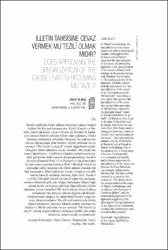| dc.contributor.author | Yılmaz, Ömer | |
| dc.date.accessioned | 2022-05-11T14:34:35Z | |
| dc.date.available | 2022-05-11T14:34:35Z | |
| dc.date.issued | 2017 | |
| dc.identifier.issn | 1300-8498 | |
| dc.identifier.issn | 2822-2261 | |
| dc.identifier.uri | https://app.trdizin.gov.tr/makale/TWpReE5UQTBOQT09 | |
| dc.identifier.uri | https://hdl.handle.net/20.500.11776/7994 | |
| dc.description.abstract | Hanefî usûlünde illetin tahsisi tartışması zaman zaman kelâmî bir hüviyet kazanmıştır. Kerhî, Cessâs ve Debûsî, illetin tahsisine cevaz verseler de Serahsî ile başlayan süreçte Hanefî usûlüne hâkim olan yaklaşım, illetin tahsisini reddetmek yönünde olmuştur. Bu yaklaşımın öncüsü durumunda olan Serahsî, illetin tahsisine cevaz vermeyi "Mu'tezile'ye meyil" olarak değerlendirmiştir. Ona göre illetin tahsisine cevaz verenler, Mu'tezile'nin temel öğretilerini - özellikle ictihadda isabet meselesindeki görüşünü- kabul etmek durumundadırlar. Serahsî ile aynı dönemde Ebü'l-Usr Pezdevî ve bu âlimlerden iki asır sonra yaşamış bulunan Ebü'l-Berekât Nesefî de ictihadda isabet meselesi ile illetin tahsisi arasında bir bağ kurmuştur. İlletin tahsisine cevaz verenlere yönelik olarak Hanefî usûlünde Serahsî, Ebü'l-Usr Pezdevî ve Ebü'l-Berekât Nesefî ile sınırlı kalan bu yaklaşım, modern dönemde pek çok takipçi bulmuştur. Buna bağlı olarak Kerhî ve Cessâs gibi Irak Hanefîlerinin illetin tahsisine cevaz vermeleri Mu'tezilî etkiye mâruz kalmış olmalarının bir neticesi olarak değerlendirilmiştir. Araştırmanın odağını, bu değerlendirmenin sorgulanması oluşturmaktadır. Hanefî usûl eserlerinde illetin tahsisi tartışması, bunun ictihadda isabet meselesi ile ilişkisi ve illetin tahsisine cevaz vermeyi "Mu'tezile'ye meyil" olarak değerlendiren yaklaşımın tarihî arka planı araştırma çerçevesinde incelenmiştir. | en_US |
| dc.description.abstract | In Hanafi methodology, the specialization of the cause sometimes reflects theological identity. Although Karkhi, al-Jassas and al-Dabusi permitted the specialization of the cause, the prevailing approach to the specialization of the cause in Hanafi methodology in the period starting with Sarakhsi was to reject it. The leading scholar of this approach, Sarakhsi considered the permission for "the specialization of the cause" to be "inclination towards Mu'tazilism". According to him, those who approve the specialization of the cause also accept other principles of Mu'tazilism, especially the principle about "isabat in ijtihad (infallibility in ijtihad)". Al-Bazdawi, who lived in the time of Sarakhsi, and al-Nasafi, who lived two centuries later after them, made a connection between "isabat in ijtihad" and "specialization of the cause". This approach was adopted only by al-Sarakhsi, al-Bazdawi and al-Nasafi in Hanafi methodology, but in the modern era, it found many followers. Consequently, it is evaluated that Karkhi and al-Jassas approving the specialization of the cause was because the Iraqi Hanafism was strongly influenced by Mu'tazilism. The focus of the research is to question this evaluation. The debate about the specialization of the cause in Hanafi methodology, and its relation with the issue of "isabat in ijtihad", and the historical background of the approach suggesting that allowing for the specialization of the cause is the inclination towards Mu'tazilism are scrutinized in this research. | en_US |
| dc.language.iso | tur | en_US |
| dc.rights | info:eu-repo/semantics/openAccess | en_US |
| dc.subject | Din Bilimi | en_US |
| dc.title | Does Approving the Specialization of the Cause Lead to Becoming Mu'tazılı? | en_US |
| dc.title.alternative | İlletin Tahsisine Cevaz Vermek Mu'tezilî Olmak Midir? | en_US |
| dc.type | article | en_US |
| dc.relation.ispartof | Diyanet İlmi Dergi | en_US |
| dc.department | Fakülteler, İlahiyat Fakültesi, Temel İslam Bilimleri Bölümü | en_US |
| dc.identifier.volume | 53 | en_US |
| dc.identifier.issue | 3 | en_US |
| dc.identifier.startpage | 53 | en_US |
| dc.identifier.endpage | 71 | en_US |
| dc.institutionauthor | Yılmaz, Ömer | |
| dc.identifier.trdizinid | TWpReE5UQTBOQT09 | en_US |



















